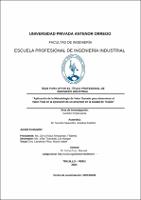Aplicación de la metodología de valor ganado para determinar el valor final en la ejecución de un proyecto en la ciudad de Trujillo

View/
Download
(application/pdf: 2.441Mb)
(application/pdf: 2.441Mb)
Date
2021Author(s)
Nureña Saavedra, Ariadna Kiabhet
Metadata
Show full item recordAbstract
La presente investigación tiene por finalidad determinar el valor final en la
ejecución del Complejo Educativo Lord Kelvin en la ciudad de Trujillo, aplicando la
Metodología del Valor Ganado. Se parte con la descripción del alcance del
proyecto por medio del Proyect Charter. En Noviembre del 2019 se hace una
identificación de los costos línea base (VP) de S/. 1’,500,000 y de los costos
reales de la obra (CA), que en avance al 50% representaron S/. 804,479,
encontrándose que el valor ganado (EV) fue de S/. 750,000. Posteriormente se
procedió al cálculo del índice de eficiencia del costo (CPI) el cual arrojó un valor
de 0.932 y del índice de eficiencia del tiempo por un valor de 0.959. Por último, se
plantearon dos escenarios para el cálculo para determinar el Valor Final de la
Obra, arrojando uno de ellos S/. 1’554,479.09 bajo el supuesto que no existirán
inconvenientes y el otro escenario S/. 1’609, 200.10 que parte de la base de que
existirán inconvenientes. The purpose of this research is to determine the final value in the execution of the
Lord Kelvin Educational Complex in the city of Trujillo, applying the Earned Value
Methodology in multiple scenarios. It starts with the description of the scope of the
project through the Project Charter. In November 2019, an identification of the
baseline costs (PV) of S /. 1 ’, 500,000 and the real costs of the work (CA), which
in advance at 50% represented S /. 804,479, finding that the earned value (EV)
was S /. 750,000. Subsequently, the cost efficiency index (CPI) was calculated,
which yielded a value of 0.932 and the time efficiency index with a value of 0.959.
Finally, two scenarios were proposed for the calculation to determine the Final
Value of the Work, one of them yielding S /. 1'554,479.09 under the assumption
that there will be no drawbacks and the other scenario S /. 1'609, 200.10 which is
based on the fact that there will be problems.
Subject
Collections
- Ingeniería Industrial [356]

